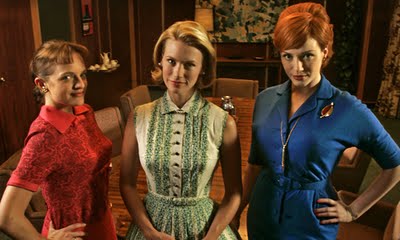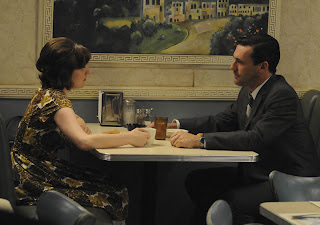Some of Betty Draper’s nuanced parenting skills.
Tag: Mad Men
Mad Men Week: Mad Motherhood
I would like to think that I will never be like Betty Draper from Mad Men. We look at her through our take on modern feminism and feel bad for her. Poor bored Betty. Thank God that we have all been liberated from only having such choices. Betty Draper going to therapy because she can’t talk to anyone about how trapped she feels. How alone. How bored and guilty she feels about the role she has no choice about in her own life. Everything from the way the birth is treated to daily choices within the home. The constant undercurrent is that of limited choices. This is not an antiquated idea. As a mother, I know how it feels some days to count the hours until bedtime. Or to not be able to wait until my husband takes two steps in the door before I am telling him about the terrors our offspring have been that day. Yes, like Betty Draper I relish having a glass of red wine at the end of the day and talking to my friends. Other mothers and caregivers in the trenches with me.
Is that why we feel bad for Betty Draper? Because we know someone like her? Our own mothers? A sister? A friend? Or does she hit a little too close to home for some of us? It is the judgment of her that I have to wrestle with. Poor Pampered Betty Draper. A housewife with a maid and nothing to fill her days but shopping. High class problems indeed. Instead of dumping our kids in front of the black and white TV with three channels, we now have the Wii in monster 65-inch color, surround-sound, high definition. Is spending hours on Etsy so much different than at the department store? Hiding from our children. Hiding from who we are. Betty being so afraid of her own sexuality that her daughter ends up in therapy for “playing with herself.” I am sure all of us have had to confront some issue with our children that we have never anticipated. “Did you really just wipe boogers on the wall?” “Is that a fish stick under your pillow?” “No, I don’t know why trees don’t talk back.”
Parts of my life are not that different from what I can imagine for a 1950s or 60s housewife. Yes I am from the Midwest. Yes I got married at 20. Yes I was pregnant at said event. I still do laundry almost every day. I still wash dishes. For the most part, I have stayed home with my children. But I like being with my kids. I like who they are. I enjoy just being with them and seeing them discover how to navigate this world. The difference now is that so does my husband. He makes more dinners than I do. It is the expectations that are different. Not the reality. I think he would fear for his life if he came home and demanded his dinner. Our house will NEVER be as clean as the Drapers’. We don’t have a maid. We can’t afford it. The choices we have made allow me to stay home. Would we be more financially secure if we had two incomes, of course. Are there mothers out there who do not have this option, absolutely. But more and more I realize that it is other women who are our greatest obstacles. No matter what a woman’s choice is, it should be supported as valid by other women. Too frequently it is not. Working mothers think that stay-at-home-mothers are lazy or spoiled, and stay-at-home-mothers think that working moms are selfish or should be riddled with guilt.
Women are our own worst enemies. Inside our own heads and out. We hear our mothers, our friends. We feel judged as mothers from the time we discover we are pregnant. Keep the baby, or not? Home birth? Water birth? C-section? You will be judged. Breastfeed? Co-sleep? Crib? You will be judged. Vaccinate? Circumcise? You will be judged. Cloth diapers or disposable, home school, or public. You will be judged. Having these choices to begin with is what we should be thankful for. I get it. But that is only half of the equation. Having choices has to be balanced with having the freedom to get to be happy with the consequences of that choice. As Don Draper put it, “If you don’t like what is being said, then change the conversation.”
Look at Peggy. Was it her choice to have a baby? Was it her choice to give it up? Was she allowed to be, if not happy, at least at peace with her decision? She was pushing so hard against the idea of being a woman that she ignored the ultimate difference between men and women: our ability to give birth. Her birth experience was glossed over and not unlike Betty’s out-of-consciousness birth, we are left amazed. We have all known someone whose birth did not go as planned. A home birth that was transferred, or a vaginal birth that had to be a c-section. Women carry around those scars, physical and emotional, for the rest of their lives.
Then Joan. We all want to be more like Joan. She is much easier to take. More modern. Career woman. Waiting until her 30s to get married. Even her physical appearance is more realistic than teeny Betty Draper. But even with all of those curves, she has chosen to be childless. With all of that sex, and two “procedures,” she is still living on her own terms. Fertile. Ready for anything. Her femininity a blatant contrast to all of the men around her.
The female characters of Mad Men bring up feelings for everyone who sees them … either we envy or pity them. Or both. But until we realize that either emotion has validity and is mirroring something about our own mothering, history is bound to repeat itself. Women need to strive to respect one another and support one another. Only then can we feel less isolated like all of the women in the show. Then we can show our children that we are the mothers they want us to be.
Olivia London-Webb writes for herself as therapy. When not writing she likes to cook, drink, stare at art, and chase her children.
True Camaraderie: Don, Peggy, and Something to Prove
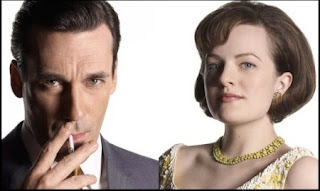 |
| Don Draper and Peggy Olson |
Mad Men YouTube Break: Peggy Olson Knows What She Wants
This clip was uploaded to YouTube by AMC, and they provided this description:
Peggy proves she can be one of the guys.
Despite the awful description (“one of the guys?” Is this really what she’s proving here??), it’s from a great scene.
Mad Men Week: Is Mad Men the Most Feminist Show on TV?
Written by Megan Kearns, cross-posted from The Opinioness of the World.
Historians are notorious for savaging historical fiction. We’re quick to complain that writers project modern values onto their characters, get the surroundings wrong, cover up the seamy side of an era or exaggerate its evils — and usually, we’re right. But AMC’s hit show “Mad Men”…is a stunning exception. Every historian I know loves the show; it is, quite simply, one of the most historically accurate television series ever produced. And despite the rampant chauvinism of virtually all its male characters (and some of its female ones), it is also one of the most sympathetic to women…But in 1965, feminism wasn’t a cultural option for most women. It would be another year before the National Organization for Women, the group that gave so many women the legal tools to fight discrimination, would be founded. Newspapers still ran separate want ads with separate pay scales for female jobs, seeking “poised, attractive” secretaries and “peppy gal Fridays.”
“But I have to say, most of the things negroes can’t do, I can’t do either. And nobody seems to care…Half of the meetings take place over golf, tennis, and a bunch of clubs where I’m not allowed to be a member or even enter.”
“What do you do around here besides walking around like you’re trying to get raped?”
there wasn’t even a word for the sexual harassment the character Joan experiences.
Joan’s decision to not go through with her abortion this season stirred up controversy. In an article at RH Reality Check, Sarah Seltzer argues,
“Mad Men” is known for being excruciatingly period-specific. Joan was not at a modern-day abortion clinic and she was not privy to a modern-day abortion debate. She had followed a specific plan which involved breaking the law and risking arrest–which speaks to a strong determination to begin with. There were no protesters and no one to tell her what she did was immoral. Sure, by the standards of her time she was a “loose woman” but there was no pro-life movement calling women selfish babykillers…It’s realistic for her character, the time period, and the plot for Joan to have had the abortion. The show’s writers and the many viewers who think “she didn’t go through with it” are imagining a modern-day conception of abortion fueled by iffy anti-choice tropes found in movies like “Juno” or shows like “The Secret Life of the American Teenager.
The real reason so many fictional characters choose to keep their babies may be much simpler than any of these theories: Babies advance plotlines, whereas abortions end them. As Ted Miller, a spokesperson for NARAL Pro-Choice America, said, “The history of abortion storylines has been mixed. The very personal circumstances are often lost in the pursuit of dramatic or sensationalized storylines.” An abortion can carry a single episode, or a few scenes in a film, while a baby provides fodder for seasons’ worth of material…Sure, Weiner could have found other ways to teach us more about the characters he’s created. But Joan’s decision on Mad Men—and Miranda’s on Sex and the City, and Juno’s in Juno, and so on—show that on screen, advancing the plot is more important than making a political statement.
Obviously Joan is not anti-abortion as she’s had two previous procedures. Barkhorn points out that some say screenwriters don’t want to show abortions as “they don’t want their heroines to appear unsympathetic.” While 1 in 3 women in the U.S. will have an abortion in her lifetime, it’s so rare for a film or TV show to depict that choice. Only a handful of shows have portrayed a character having an abortion including Maude, Private Practice and Friday Night Lights. Barkhorn also points to characters on Sex and the City (Samantha and Carrie) both of whom had abortions in their characters’ past. But when Miranda becomes pregnant and resigned to have an abortion, she backs out at the last moment. While some characters have gone through with abortions, it makes it seem that it’s a decision that young people choose, not successful adult women.
“You do your job so well. They respect you and you don’t have to play any games. I didn’t know that was possible.”
Peggy: “You know I just saved this company. I signed the first new business since Lucky Strike left. But it’s not as important as getting married…again.”
Joan: “Well I was just made Director of Agency Operations, a title, no money of course. And if they poured champagne it must have been while I was pushing a mail cart.”
Peggy: “A pretty face comes along and everything goes out the window.”
Joan: “Well I learned a long time ago to not get all my satisfaction from this job.”
Peggy: “That’s bullshit.”
Then they giggle knowingly.
We should be glad that the writers are resisting the temptation to transform their female characters into contemporary heroines. They’re not, and they cannot be. That is the brilliance of the show’s script. “Mad Men’s” writers are not sexist. The time period was.
Things They Haven’t Seen: Women and Class in Mad Men
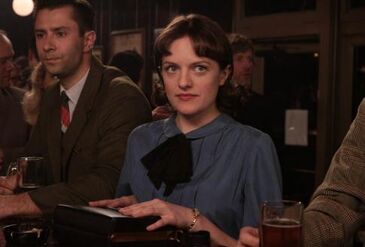 |
| Peggy Olson |
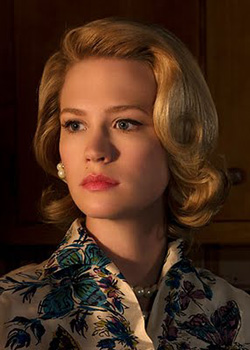 |
| Betty Draper Francis |
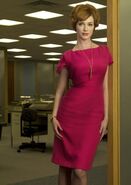 |
| Joan Holloway Harris |
Mad Men YouTube Break: The Mad Men School of Seduction
Sexual harassment or seduction? Sometimes it’s a fine line in Mad Men.
In my opinion, the best line award goes to Peggy:
I’m in the persuasion business, and frankly I’m disappointed by your presentation.
Or maybe it goes to Roger, for sheer…weirdness:
I want to suck your blood like Dracula.
What are some of your favorite “lines” from the show?
‘Mad Men’ Week: Hey, Brian McGreevy: Vampire Pam Beats Don Draper Any Day
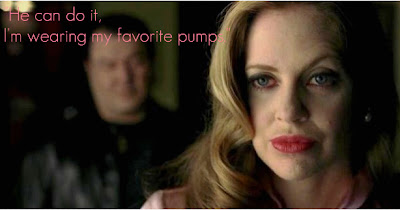 |
| Vampire Pam saying, “He can do it; I’m wearing my favorite pumps.” |
Just as the Frito-Lay Company has created virtually nutrient-free vehicles of corn syrup and salt that make our youth fat, slow, and indiscriminate, the Castrati vampire is a confection that has the same impact on the psycho-dramatic imagination of today’s youth. Think of the message here: What is the consequence of falling in with a Romantic vampire? Death, either yours or his. What is the consequence of falling in with the Castrati vampire? Long and torturous (at least to everyone around you) conversations about feelings. This is not what really happens when you fall in with attractive monsters.McGreevy isn’t feeling Stephanie Meyer’s sparkling undead abstaining teens. But he has equal disdain for the sexed up vamps on True Blood, which, in his words, is “like Tennessee Williams fucked The Rocky Horror Picture Show.” See, blood suckers should be real men “ideal men” like Mad Men’s Don Draper.
Of course I refer to Don Draper on the AMC series Mad Men, the purist’s vampire of choice for our time. This one has teeth. And adding an extra layer to the mystique is his position as an advertising executive. A more elegant embodiment of the metaphor could hardly be asked for: He is an engine of want, creating the illusion of fulfillment while sucking you dry. No is not in his vocabulary. Neither is yes—yes is implicit. He knows this, he is past needing to hear you say it. He knows the private and unmentionable place that cries “yes” when the bottom drops out of an amusement park ride and suddenly you are in free fall, and, like the ideal man, he is listening.
When Mad Men first premiered, much of its appeal was attributed to novelty factor: What a different time it was, when the American male was an unrecognizable breed of scandalous, id-driven malefactor; heedless, rapacious, just waiting to slide off his doe-eyed secretary’s pencil skirt and show off his executive account.
…
Men are predators at heart. Any refutation of this is also a refutation of evolution, or the common sense conclusion of observing a typical 3-year-old boy at unstructured play, his wake of destruction the envy of a Visigoth. It is a killer’s heart that is the motive force of masculinity and predation its spirit. This is not to suggest nature is immutable, or that one ought to act in blind obeisance to it, but that “ought” is not in the vocabulary of want, and choosing is meant to have consequences.
Mad Men Week: It’s Coming
Mad Men Week at Bitch Flicks – Call for Writers
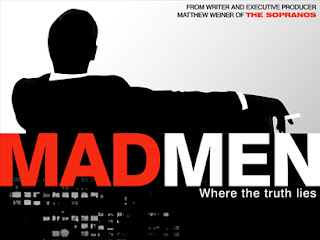 |
| Mad Men…it’s on. |
Announcing…Mad Men Week at Bitch Flicks! Monday, August 29th – Friday, September 2nd!
- All pieces must be emailed by Friday, August 26th.
- If you intend to submit, please email a brief description of your piece as soon as possible.
- Contact us at btchflcks(at)gmail(dot)com.
Need some ideas? Here are some themes you could write about (you can also propose your own):Character analysis of Betty
Character analysis of Peggy
Character analysis of Joan
Character analysis of the (individual) menThe supporting women
Sexual assault in MM
Race in MM
Betty Draper and the Feminine Mystique
Sexual harassment in the agencyMotherhood in MM
Female bodies and the male gaze of MMMM and Feminism
MM and Enlightened Sexism
Review/analysis of pivotal episode(s)
Favorite lines/moments
Fashion & the performance of the feminine
Critique of article you’ve read about the show
The possibilities are endless…
We look forward to reading your pieces for our first Theme Week here at Bitch Flicks!
YouTube Break: Peggy Olson on Women in the Workplace
2011 Emmy Nominees
Lead Actress in a Comedy Series
Laura Linney for The Big C
Edie Falco for Nurse Jackie
Amy Poehler for Parks & Recreation
Melissa McCarthy for Mike & Molly
Martha Plimpton for Raising Hope
Tina Fey for 30 Rock
Supporting Actress in a Comedy Series
Jane Lynch for Glee
Betty White for Hot in Cleveland
Julie Bowen for Modern Family
Kristen Wiig for Saturday Night Live
Jane Krakowski for 30 Rock
Sofia Vergara for Modern Family
Lead Actress in a Drama Series
Elizabeth Moss for Mad Men
Connie Britton for Friday Night Lights
Mariska Hargitay for Law & Order: Special Victims’ Unit
Mireille Enos for The Killing
Julianna Margulies for The Good Wife
Kathy Bates for Harry’s Law
Supporting Actress in a Drama Series
Kelly Macdonald for Boardwalk Empire
Christina Hendricks for Mad Men
Michelle Forbes for The Killing
Archie Panjabi for The Good Wife
Margo Martindale for Justified
Christine Baranski for The Good Wife
Lead Actress in a Miniseries or Movie
Kate Winslet for Mildred Pierce
Elizabeth McGovern for Downton Abbey
Diane Lane for Cinema Verite
Taraji P. Henson for Taken from Me: The Tiffany Rubin Story
Jean Marsh for Upstairs Downstairs
Supporting Actress in a Miniseries or Movie
Evan Rachel Wood for Mildred Pierce
Melissa Leo for Mildred Pierce
Mare Winningham for Mildred Pierce
Maggie Smith for Downton Abbey
Eileen Atkins for Upstairs Downstairs
